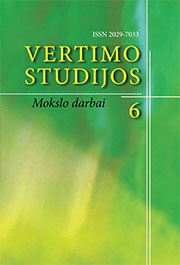NEVERČIAMI TEKSTAI VERTIME
TEXT OUTSCORING IN TRANSLATION
Author(s): Nijolė Maskaliūnienė, Ligija KaminskienėSubject(s): Theoretical Linguistics, Lexis, Translation Studies
Published by: Vilniaus Universiteto Leidykla
Keywords: Translation; Lexical units; Source text;
Summary/Abstract: The purpose of the article is to present two types of seemingly similar untranslatable entities: units of translation and parallel texts. Units of translation are defined as lexical units grouped together to form a single element of thought. They range from a single word to a complete text. Imbedded in the tradition and culture of the source text, such units – marriage vows, prayers, etc. – may be canonized or legitimized, thus acquiring a legally protected status in the culture. Parallel texts, on the other hand, are two linguistically independent products arising from an identical (or very similar) situation. The analysis of parallel texts in this article is narrowed down to public directives. Public directives as communication acts convey conative function, i.e. they express an intention on the part of the speaker to effect future action on the part of the addressee. The public messages are characterised by conventionality, addressor and addressee relations, linguistic norms, traditions and culture. Any violation of the parameters may result in a failure of the intended impact upon the addressee, thus public messages should not be translated: they should be outsourced from the target text culture.
Journal: Vertimo studijos
- Issue Year: 6/2013
- Issue No: 6
- Page Range: 60-74
- Page Count: 15
- Language: Lithuanian

